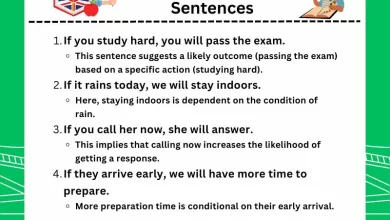20 Examples of Second Conditional Sentences
In the realm of English grammar, conditional sentences are vital for expressing hypothetical situations and their possible outcomes. Among the four types of conditionals, the second conditional is especially useful for discussing unreal or improbable scenarios. In this article, we delve into the structure, usage, and nuances of the second conditional, providing you with 20 detailed examples to enhance your understanding and mastery of this grammatical form.
What is the Second Conditional?
The second conditional is used to talk about situations that are not real and are unlikely to happen. It describes hypothetical scenarios and their possible outcomes. The structure of a second conditional sentence includes two clauses: the if-clause (conditional clause) and the main clause (result clause).
Structure of the Second Conditional
The typical structure of a second conditional sentence is:
- If + past simple, would + base verb
For example:
- If I won the lottery, I would buy a new house.
Usage of the Second Conditional
The second conditional is used in the following contexts:
- Unreal or Improbable Situations: To talk about things that are not likely to happen in the present or future.
- Example: If she were a millionaire, she would travel the world.
- Imaginary Conditions: To describe imaginary scenarios that could happen if certain conditions were met.
- Example: If he had a car, he would drive to work.
- Advice and Suggestions: To offer advice or suggestions using hypothetical situations.
- Example: If I were you, I would take the job offer.
20 Examples of Second Conditional Sentences
Let’s explore 20 diverse examples that illustrate the versatility and application of second conditional sentences.
Examples of Unreal Situations
- If I had wings, I would fly to the top of the mountains.
- If we lived on Mars, we would experience different gravity.
- If she owned a castle, she would host grand parties.
- If they knew the answer, they would solve the puzzle.
- If he spoke Italian, he would work in Rome.
Examples of Imaginary Conditions
- If I were a bird, I would sing beautiful songs every morning.
- If the sun never set, we would always have daylight.
- If she had a magic wand, she would create a magical world.
- If he could read minds, he would understand people’s thoughts.
- If they were superheroes, they would save the city.
Examples Offering Advice
- If you were more patient, you would succeed in negotiations.
- If I were in your shoes, I would study harder for the exam.
- If she focused more, she would achieve her goals.
- If he asked for help, he would find a solution.
- If they tried new methods, they would improve their results.
Examples Reflecting Personal Desires
- If I had a time machine, I would visit ancient civilizations.
- If we found a treasure, we would donate it to charity.
- If she saw a unicorn, she would be amazed.
- If he discovered a new planet, he would name it after himself.
- If they won the championship, they would celebrate all night.
Tips for Using the Second Conditional
Mastering the second conditional requires practice and an understanding of its nuances. Here are some tips to help you use it effectively:
- Be Mindful of Verb Forms: Ensure that the verb in the if-clause is in the past simple tense, while the main clause uses “would” followed by the base verb.
- Use “Were” for All Subjects: In formal writing, use “were” instead of “was” in the if-clause, regardless of the subject. For example, “If I were” instead of “If I was.”
- Practice with Different Scenarios: Create your own sentences using various subjects and situations to become more comfortable with the structure.
Conclusion
The second conditional is essential for expressing hypothetical and imaginative scenarios in English. You can effectively convey complex ideas and thoughts by understanding its structure and usage. The 20 examples provided in this article serve as a guide to help you master this conditional form and apply it in diverse contexts. As you practice and explore more scenarios, your proficiency with the second conditional will enhance your overall communication skills.
